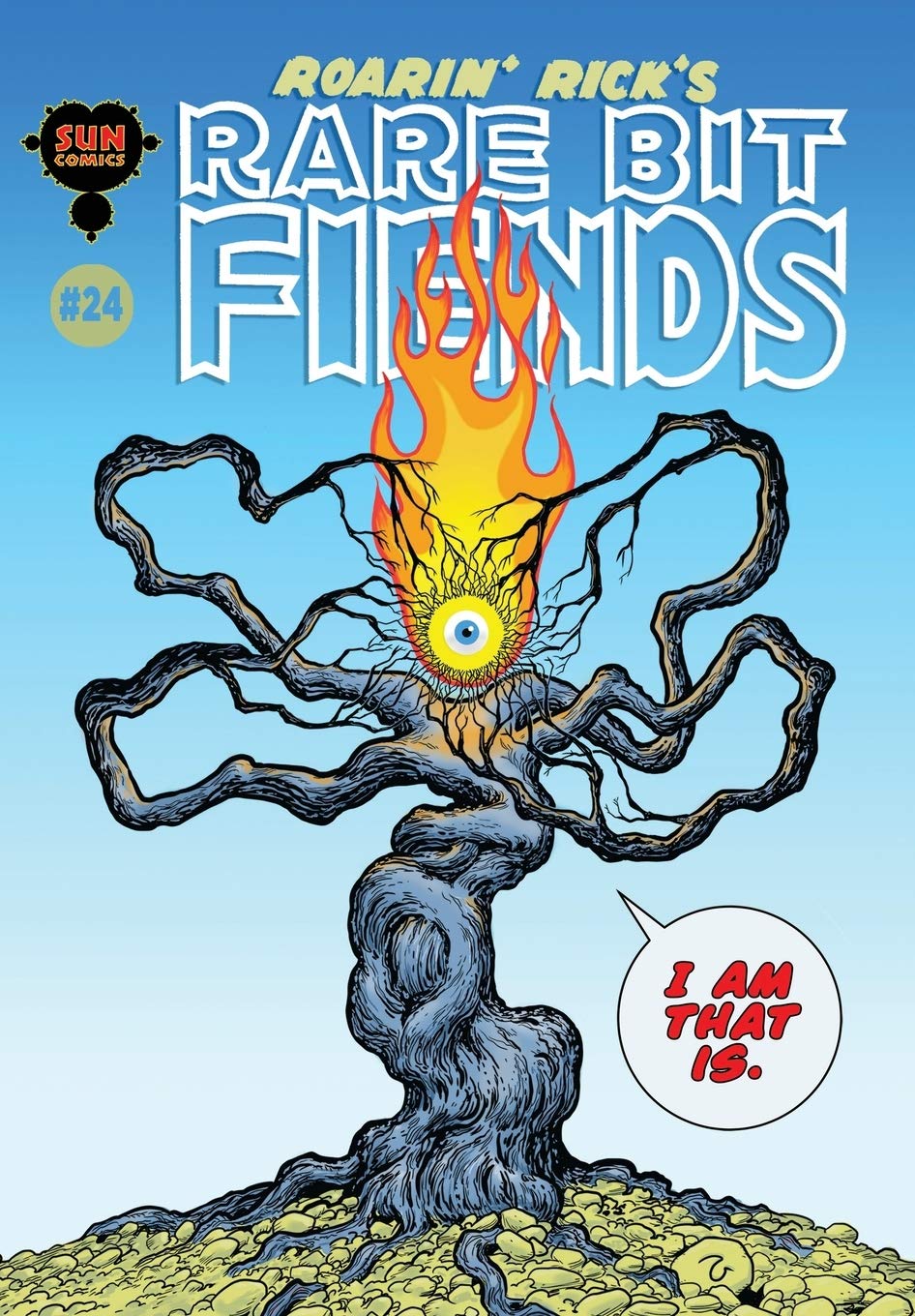A mainstay of independent comics for decades, the last few years have seen an explosion in creativity from Rick Veitch. Fueled by the freedoms offered by modern publishing tools, Veitch has brought older work back into print, created Panel Visions, an experimental line of single panel graphic novels, restarted his Rare Bit Fiends series, and committed himself to finishing his long-dormant magnum opus, King Hell Heroica.
I caught up with Veitch via Zoom to chat about all of these works, the educational comics business he runs with Steve Conley, why you won’t find any of his recent work on the shelves of your local comics store, and how after three decades, Swamp Thing #88 is still too controversial for DC Comics to release. - Jason Bergman
* * *
Jason Bergman: I want to start by offering my condolences on the loss of your brother Tom. I've seen some very nice tributes to him online. I don't know if you've seen any of those.
Rick Veitch: I have. It's really heartwarming to see how many people he touched in his lifetime.
You both had a deeply spiritual aspect to your work. I don't know if that's from a shared upbringing or what, but it seems to be a common theme in your respective work.
It grew out of the hippie ethic, I think. Tom was in his late twenties and I was a teenager in the '60s, so we absorbed a lot of that spiritual thinking that bubbled up from the counterculture.
Did he introduce you to comics, or the undergrounds?
He introduced me to a lot of things, but in terms of the undergrounds, first it was “C” Comics, a proto-underground comic by Joe Brainard and Ron Padgett. That would have been in 1965. Tom was in San Francisco when Zap came out and sent me a copy. I had been making my own homebrew superhero comics, and like everyone else, Zap turned my head around.
I want to talk specifically in this interview about your recent work, because you have been very busy, both as a publisher and as a creator. I made a list! In the past few years, you've reprinted your out of print books, released three volumes of Boy Maximortal, five experimental Panel Visions books, three new issues of Rare Bit Fiends…
I'm pretty sure there's other stuff that I haven't included, but that's a substantial output, even for someone like yourself who has never necessarily stopped working for any stretch of time. Is that all because of print on demand, and the ability to put things out as you see fit, or is there another reason?
You missed my secret identity as an educational comics creator! Steve Conley and I have a company called Eureka Comics that specializes in comics for the educational and informational market.
Do you draw those yourself, or do you just publish?
We write and draw them, producing them for organizations. It's real commercial work that pays much better than regular Marvel or DC rates, and leaves me with a lot of time to follow my own vision. The print-on-demand system provides the logistics of getting my creative stuff to readers.
And you were named the Official Comics Laureate for Vermont in 2020.
You forgot to curtsey. [chuckles]
What has that been like?
It hasn’t had much impact on my life, probably, because we’re living in the plague years. When I got named, I was originally supposed to meet the governor, and appear in front of the Vermont House but that was right when COVID hit. So I got the proclamation from the legislature, but I didn't get the State House stuff. I gotta say I'm really proud of my state for having such an office; it says something really nice, and long overdue, about comics.
You get to hold the title for another year. It goes until 2023, so there's still time.
If anyone needs a ribbon cutter at an event, I’m ready!
While you’ve had this massive output, your decision to go through Amazon means you've more or less cut out the direct market. Does that concern you at all?
I’m sure I could get back in if I wanted to. In fact IDW released some nice hardcover editions of Brat Pack and The One to the DM. But I’m looking for more than the DM has to offer me. I came up in mainstream comics just as the direct market formed, and we all had such high hopes for what it could do for our art form. That first decade of the DM was pretty amazing in terms of the kind of comics that came out. There was a wild unleashing of grassroots creativity that has certainly shaped the current cultural landscape we’re living in. But the DM started to fall apart in the mid '90s and it's all been downhill since.
These days the direct sales market is mostly about Batman with 17 covers. People aren't even reading those comics. They're just weird collector items. I'm really interested in comics as a reading form, as an experiential form.
What’s great about print on demand is that it allows me to pursue my muse without having to think about any market at all. It does provide a structure that keeps me rolling forward to get projects finished and released. But I can do it in my own time and not be subject to a publisher’s deadlines and concerns. They pay royalties every month. I don’t have to shlep books.
Has the lack of in-person convention appearances made a difference to you at all in the last two years?
I haven’t been doing a lot of American conventions for a while. I got burned out on that back in the mid '90s. I do a few here and there, but the ones I really like are the ones in Europe, which are cultural festivals rather than the American style flea markets.
Do you see the relationship between creator and reader changing or coming back to what it used to be in some way?
Comics are finding a new audience outside of superhero comics which is a very good thing. The last pie chart I saw showed something like 50% of the US market was Manga, another 30% of the market was Young Adult, which Scholastic has sewn up, and the rind is the superhero publishers who control the decrepit direct sales market trying to sell the same stuff to the same consumers over and over again.
As a person who loves the art form of comics, and the superhero genre, I yearn for a marketplace that provides fertile soil for what comics can be, rather than what they were.
You chose to go through Amazon for print on demand, but not comiXology. Was that a conscious decision? You were listed on Amazon, but if you went specifically looking for Rick Veitch digital comics, you wouldn't necessarily find any.
comiXology just merged with Amazon--
Yes they did, so now it's a moot point right? It's-
I don't think my print on demand books are in comiXology, even though it's Amazon.
They are now, because comiXology is Kindle now. It's a re-skinned Kindle.
About fifteen percent of my sales are digital. Most of my readers seem to prefer the printed book. I should give a shout out to Steve Bissette for turning me on to how print-on-demand worked. He showed me horror magazines his friends were putting out using the POD system.
I already had most of the digital skills required so I just had to learn their software. I did Super Catchy first; jumping onto social media to let people know, and that's really all it took. Now I’ve got thirteen titles, with more on the way!

Well, that's a good segue into the Panel Visions line, because I find the variety in those pretty fascinating. You've done a western, two dreamlike experiments, the linguistic experiment that was Redemption, and then the pop art piece, Super Catchy. Is your plan to let your creative self run wild, and put out what you like?
Panel Vision is like a new toy box for me. I've been drawing comics my whole life, and so I'm always looking for new avenues to make it exciting and creative, and somehow I stumbled onto this idea of a single panel per page. I'm not the first one to do it of course, but I really liked how the format naturally allows the reader to experience a comic in a different way.
I like how it gets the reader to spend more time per panel, and how it allows me as the creator to use that “space and time," to add little synergistic elements in there that you wouldn't even try to do on a six panel page.
Did you land on the single panel per page with the intention of them being read on a digital device, or was it still for print?
Both. Obviously-
The way you've been doing it does make them ideal to be read on anything really. Even a phone.
I prefer a printed book. And with the Panel Vision titles I like how each one provides a single unique reading experience with no other distractions.
Do you have any set cadence for releasing them, or is it whenever you feel like it? When you have an idea or the time?
It's a time thing. I do what I can fit into my schedule. I've been jumping around between doing Boy Maximortal, Rare Bit Fiends and Panel Vision. I’m putting out two titles a year, sometimes three.
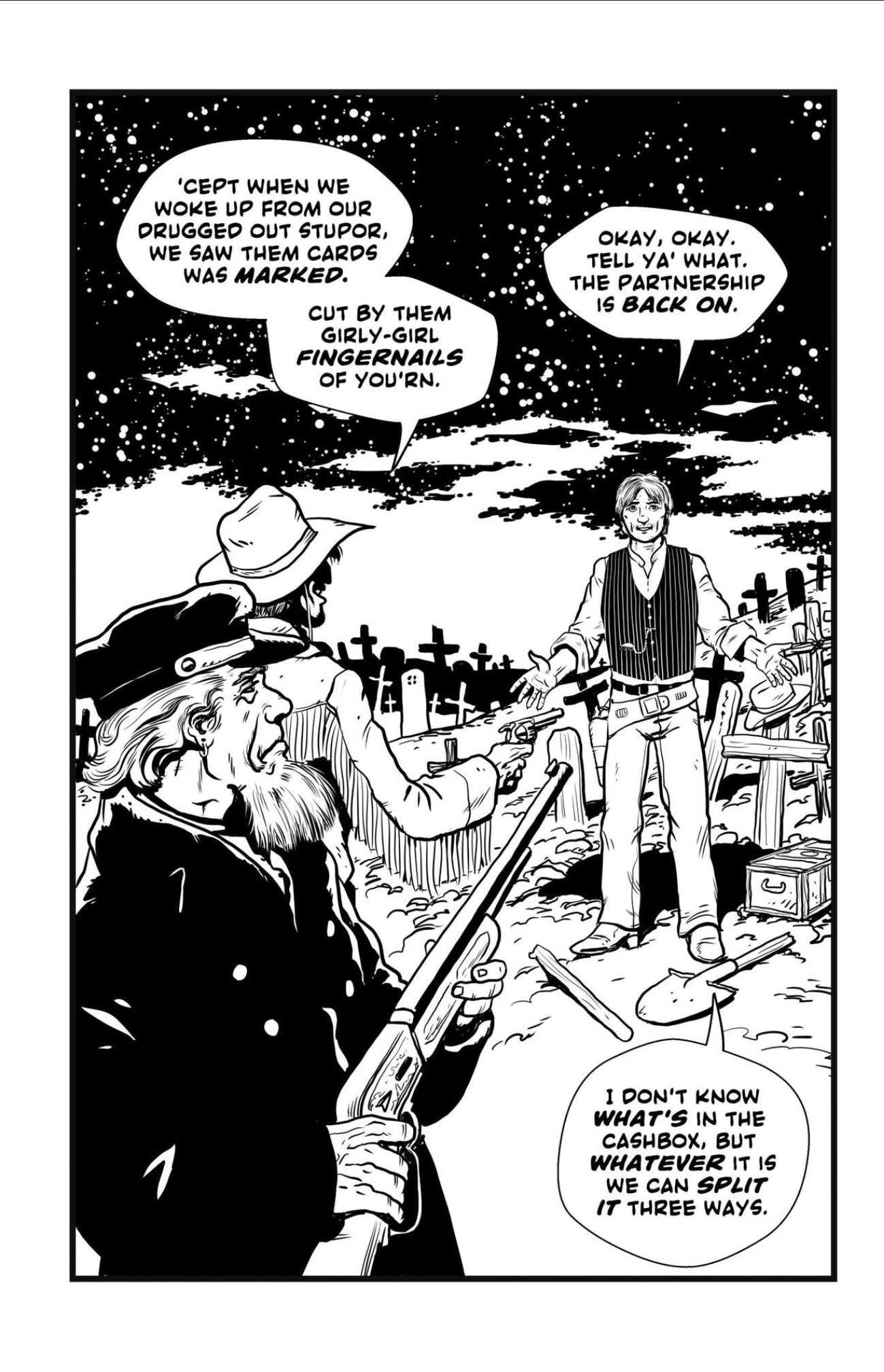
These are all being done digitally, right? There's no page involved with this anymore?
Yes. I mostly work on a Cintiq using Clip Studio Paint software. But a couple of the Panel Vision books were done on an iPad using ProCreate. Tombstone Hand was an interesting experiment. I started it with no script or plot even, just a couple vague ideas. I wrote and drew one panel a day, letting the story grow organically, panel by panel. I was really happy with how it turned into a fully integrated story with a beginning, middle and end with lots of twists and turns along the way.
Has that changed-- I can remember going back many years now, you've done the zoom in style panel after panel, but I've noticed, especially in some of the Panel Visions, you've been doing that more often. Is that significantly easier now that you're on digital?
Yes of course, but we all had Xerox machines back in the day. But working digitally probably saves 30% of the time needed to do a page compared to the old analog way.
Well, your biggest project of the last few years has been the King Hell Heroica, encompassing the original Brat Pack, Maximortal, and the current series, Boy Maximortal. The series is a combination of all the themes of your entire career. Your views of superheroes, the history of the medium, your spirituality, all wrapped up with this Vonnegut-esque storytelling style.

You originally laid out the overarching plan way back in the early '90s. Has your vision for the series changed at all in that time?
No, it just gets deeper I think. After laying out the structure and committing to it, you carry it around with you. Even when you're not working on the project, it's humming away in the back of your brain. So it's been a living project for a long time.
Even in those years where you weren't actively working on it?
I'll tell you what – Swamp Thing and Abby are still in there. Part of me is still thinking about those characters, even though I'll never work on them again. You get so tied up with them creatively that you can't just cut them loose.
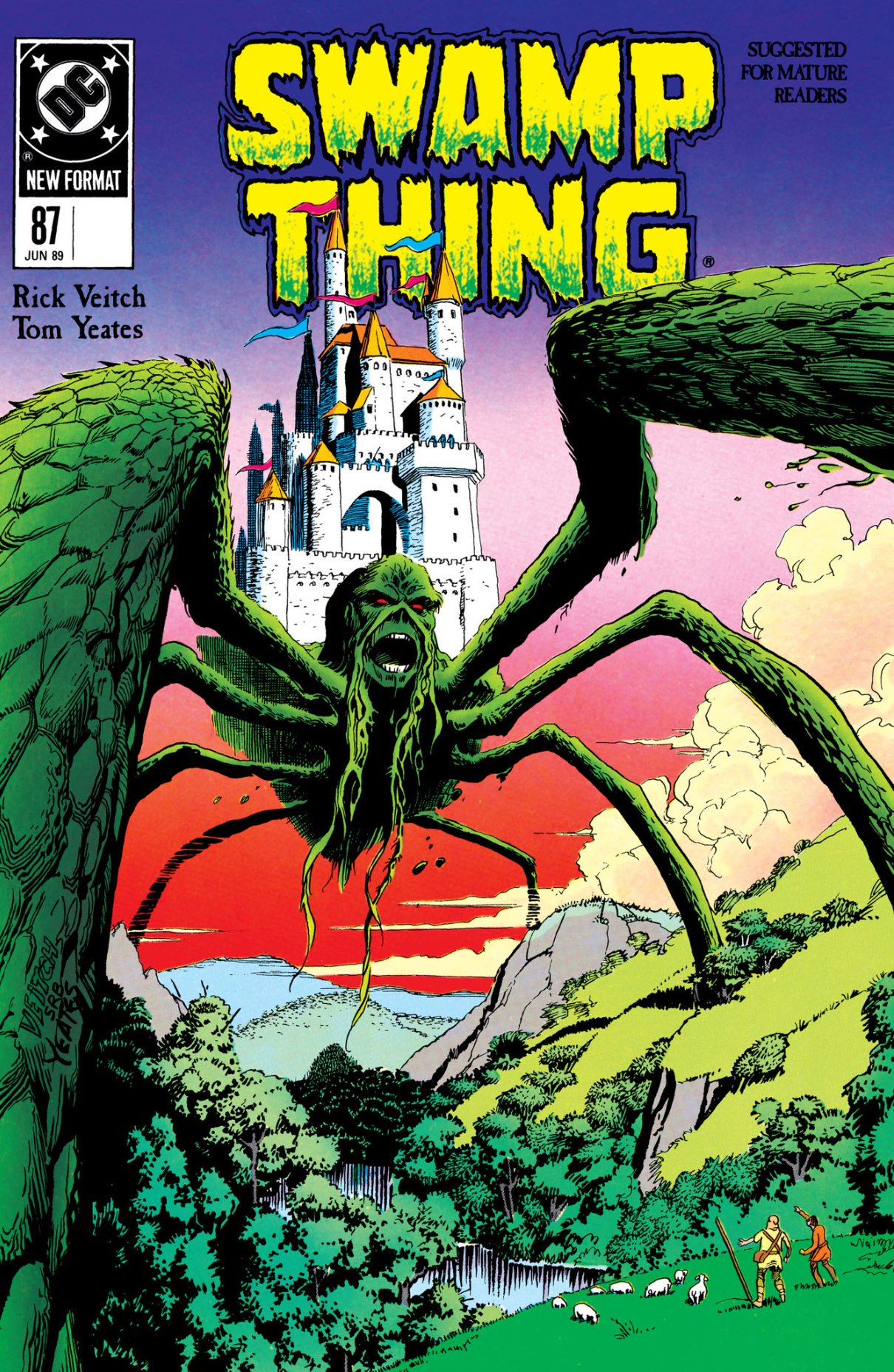
I’m glad you mentioned Swamp Thing, because the last issue of your run was completed, but - notoriously - never published. Will there ever be a world where that issue finally comes out?
Boy, we came close a couple years ago. Somebody at DC got a hold of me and they said, "Okay, we want to do this." Swamp Thing was on TV and they wanted to do an Absolute Edition of my run as writer/penciller. The plan was to include Swamp Thing #88 and let me finish the last chapters of the time travel storyline.
But as we were discussing this, they got into a new batch of trouble over a Vertigo book called The Second Coming which was about a superhero who meets Jesus. A conservative website started a petition against it and got 200,000 signatures so they canceled Second Coming and my Absolute Edition got shitcanned.
Just to be clear, over 30 years later, we still haven't reached a point where DC is comfortable publishing that story.
As an underground cartoonist, I'm perversely proud of the fact that my story is the one that they can't do. [laughter]
You should definitely get some award for that. Coming back to King Hell though, The One came back into print recently, and while it's not actually part of the Heroica line, it's very similar thematically. Was it a first draft?
Well it was before we knew where superheroes were going. I did The One in 1983, 1984. I had just read Marvelman, which Alan Moore, Garry Leach and Alan Davis did in Warrior.
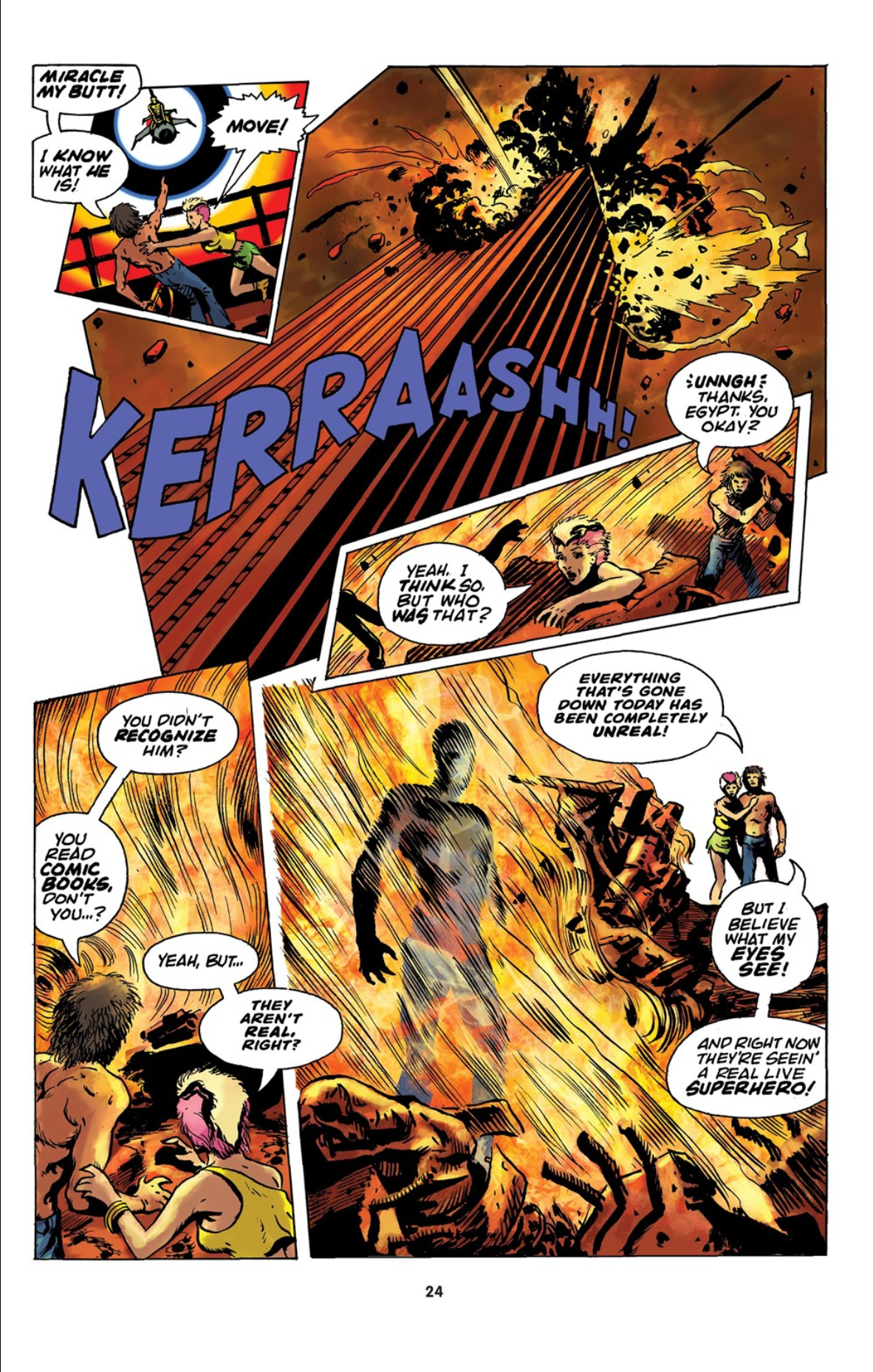
A series you would later join, of course.
At the time I was looking down my nose at superheroes, but those guys re-awakened it in me. The One is early-’80s revisionism; but not quite the grim and gritty thing that developed into Dark Knight and Watchmen. It's more underground-y. It was greatly inspired by the nuclear chest thumping that Reagan and the Russians were going on about at the time.
The reissue of The Maximortal has this essay in the back, and in it you say regarding World War II, “The side that utilized the superman as a highly controlled, profoundly racist, depersonalized propaganda tool was defeated by opponents who transmuted the idea into a totally absurd fantasy character that embodied a form of patriotism run amok.”
Makes sense.
Is that the heart of the Maximortal and the King Hell line?
That's part of its DNA, but the true heart of it lies with the superhero representing something deeply spiritual in us. If you think of the superhero as a dream figure, he’s a messenger from the very core of us, an idea brought home by Jack Kirby’s character “The Source.” I see the superhero as a modern myth that is trying to wake us up to the real source behind our lives.
Mainstream publishers and movie companies are stuck in the dark egoic style of superheroes. I think if they're allowed to develop organically and evolve as they should, then superheroes could bring a much deeper spiritual imagination to their stories.
When you say evolve, you mean the superhero as a concept. Do you think it’s stuck in a rut, then? I know Alan Moore has said he believes so.
You have to ask me? What do you think?
Well, I'm the interviewer, so I get to ask you. [Laughs]
Yes, of course it’s stuck. And Hollywood has cemented it even worse into the larger culture. It seems to have settled into that fascistic ubermensch variation of superheroism, the empowered ego run amok, and that's probably an honest reflection of the body politic these days. Some young genius needs to come along and blow it up.
Does sincerity in the creation factor in it all? From what I can tell, Simon and Kirby were sincerely patriotic when they created Captain America, and Siegel and Shuster really were creating the protector of the little guy with Superman. Are you saying with Maximortal that idealism is inherently subject to corruption?
A good illustration of what I’m talking about is Jack Kirby. In World War II, he creates a jingoistic propaganda style superhero, then picks up a gun and goes to Europe to fight fascists. 20, 30 years later he comes up with New Gods, which is a very profound meditation on fascism.

And in New Gods Jack also brings a deeply spiritual concept into comics, The Source. He was on a creative arc going in the right direction, but I think the marketplace failed him.
Was it the marketplace necessarily that failed him, or was it people in positions of power influencing the marketplace in that direction?
Well, there is an argument that I've heard that the independent news distributors were selling the books under the table, and it wasn't just Kirby books. It was also the Wrightson books, the Kaluta books, Barry Windsor-Smith books. All the stuff that readers wanted was being listed as unsold and going out the backdoor for cash. At the time, DC was really trying to rethink who they were and what they were doing but they were undermined by their own distribution system.
Regarding the current state of comics, or at least superheroes: have you heard about the plans to integrate Miracleman into the Marvel Universe? I’m curious about your thoughts there, both because of your history with the character, and its foundational role in bringing ideas into comics in the ‘80s.
All I can say about Miracleman is that Marvel and I entered into an agreement concerning the rights I held and that I am very happy with the arrangement.

Boy Maximortal starts off with two comics personalities from the very first page, S. Clay Wilson and Gilbert Sheldon. Why those two?
Well, the first point I’m making is that Wonder Wart-Hog is another variation of the superman archetype. The second point is that my Maximortal comic is kind of the illegitimate love child of S. Clay Wilson and Curt Swan. [laughter]
Another interesting thing about Boy Maximortal are the constant shifts in tone. You go from being philosophical, violent, and then also pretty funny. In issue two, you tackle the great thought experiment of what would happen if Superman had sex. Is maintaining that balance of satire and seriousness a challenge for you?
No, it's how I naturally roll. Working in the regular mainstream with publishers and editors, I was kind of constrained. At the bottom of my secret heart of hearts, I really am an underground cartoonist. I just happened to get onto the mainstream gravy train in the ‘80s when it was like the Wild West, but I started getting into trouble as soon as I got there.
Well, there's two things I want to touch on there. First is your mainstream work, because Swamp Thing aside, you've done other work for DC. You've done some mainstream work. Did you find that rewarding, or did you find the blinders you were forced to put on confining?
Well, I've been really fortunate. One was to work with Alan Moore whose writing speaks for itself. Anytime he called and wanted me on a project, I would say yes. Often the business end of those projects was ridiculous but it didn’t matter; he’s such a fun guy to work with. Ultimately we ended up back at DC with ABC Comics when they bought Wildstorm, which kind of exemplifies the crazy behavior that business guys brought to their dealings with Alan. That said, I really loved working on Greyshirt.
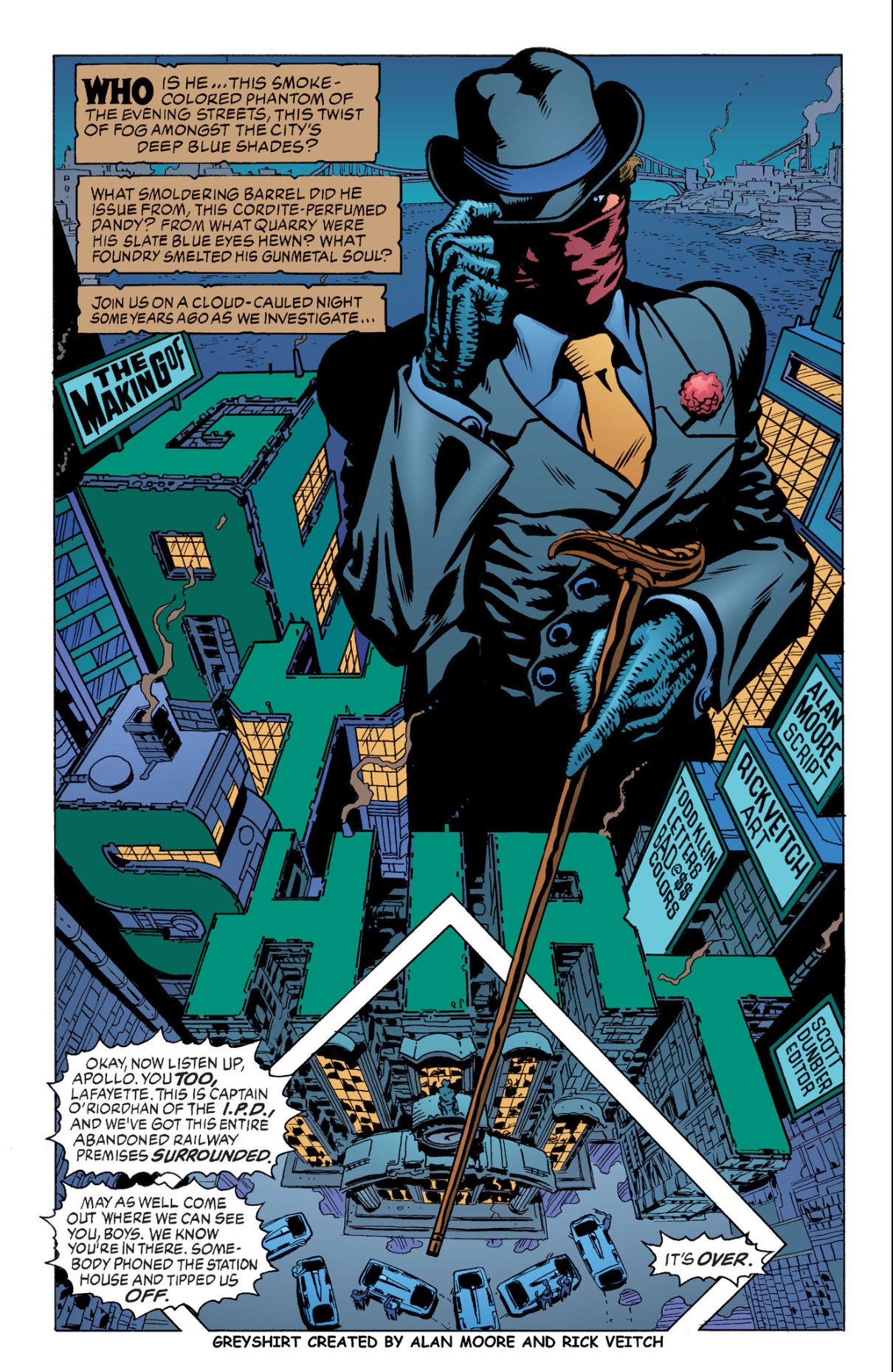
Greyshirt was your tribute to Will Eisner.
Yes, and we worked on Supreme together as well, which was his tribute to Weisinger’s Superman. But I was drawn back to DC because I liked working with Karen Berger too. She greenlit Can’t Get No and Army@Love at Vertigo. No regrets there as both are pretty uncompromising and all rights have reverted to me. The last thing I did for DC was a really beautifully written story by Josh Dysart for Unknown Soldier. It got nominated for an Eisner. Never heard from DC again after that. [chuckles]
And then there’s the educational books. How does that process work?
It started out, I got contacted by the University of Quebec. They had a grant from a giant drug company to create a series of fantasy-style comics that would be used in classrooms to help kids deal with social issues. The pay was like three to four times more than I would get drawing Swamp Thing. The quality of people you got to work with made it very interesting work. And the fact I could use my comics creating talents to help kids cope was really cool. So I formed Eureka Comics with Steve Conley to see if we couldn’t expand the market.
We went around to various meetings doing the dog and pony show, and we ended up at McGraw Hill Educational where some people were against the idea of using comics to teach and some were very much for it. We challenged them to give us a complicated subject that we would adapt into a six or seven page story. They chose the Scopes Monkey Trial and when they saw it the light bulb went on in a lot of heads.
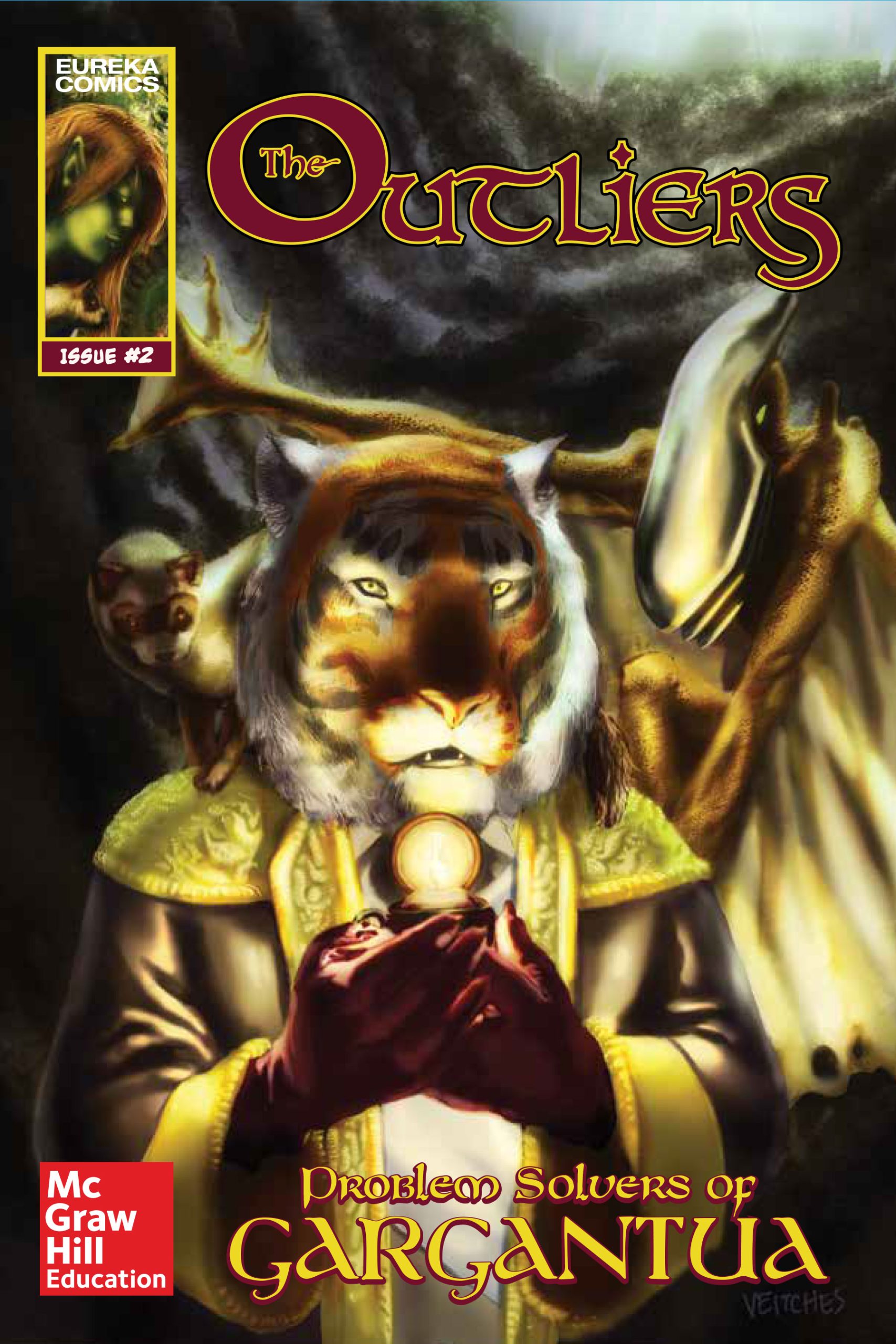

They gave us a contract to do six math workbook graphic novels. They used graphic novel storytelling techniques to teach middle school and high school math. So the books had fantasy characters running around having adventures for a few pages then, they'd stop and do some math, like to count the loot or measure the width of the chasm they needed to get across. It taught kids math visually, in the middle of a fantasy story.
Eureka grew from there, doing more comics and motion comics for McGraw Hill. We did one for the International Monetary Fund. Right now we’re working on a project with the University of Vermont funded by the National Endowment for the Humanities. It’s a series of comics about real life Vermont farmers. I can’t tell you how much it warms my heart to be able to say that!
Well, it's funny because Will Eisner did that way back when.
There you go. He came to the Kubert School, when I was there, and he had two things he wanted to tell us. One was the graphic novel. That was the first time I heard the term, and he zeroed in on it, saying comics could and would be literature. The other thing he said was that informational comics for advertising and education had huge potential. So, yeah, definitely inspired by Will.
I know Scott McCloud was hired by Google at one point, but for the most part, these things seem to be happening under the radar.
I think it's going on, but the end products aren’t seen by comics fans. One of the courses up at The Center For Cartoon Studies is called “Applied Cartooning”, which is creating comics for informational and educational purposes. So I think there are a lot of people working the same side of the street.
Well, I want to come back to Maximortal, because it is like I said, your magnum opus. A couple of the influences you've called out in Maximortal are two of my favorite books. One is Men of Tomorrow, and the other is An Unlikely Prophet. I've described it to people as being those two books, combined with Vonnegut.
I've actually been trying to touch on 20th century philosophy, and kind of tie it to a spiritual view of the world seen through the prism of a comic book superhero. I don't know if I'm saying that correctly.
No, I think you are, because you bring in all these real-world people. You've got Aldous Huxley, you've got Burroughs, Thích Quảng Đức. You bring in all these real people and sometimes they're saying things they actually said, and sometimes they're fictionalized.
It’s fun to learn what they were about then bend it toward my superhero vision, to make my point that there's more to the genre than Batman fighting the Joker.
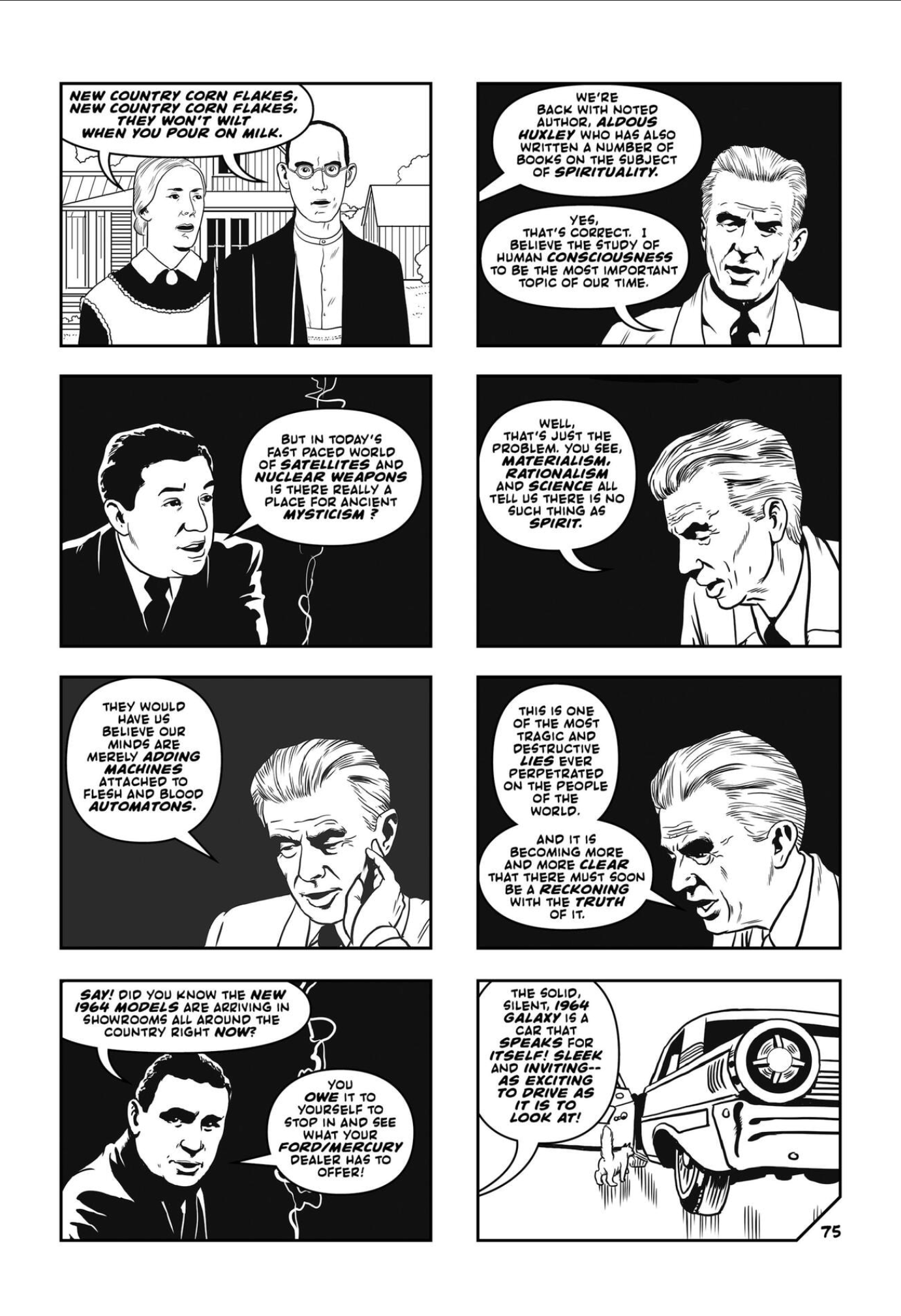
Well, I noticed. After reading, I think it was in issue two, I went and I watched that interview with Aldous Huxley on Mike Wallace, because I wanted to see what the real version was like.
I had just read his book, The Perennial Philosophy, in which he describes a certain kind of visionary experience, then proceeds to show the reader how it exists in all world cultures throughout history.
You basically were quoting from him, but adding in the superhero.
Exactly.
At the same time that you're using all these real people you also, in issue three, you went for pure satire, showing the war room from Dr. Strangelove.
It just seemed right. I knew that I wanted to bring Kennedy into the story. I already had established the government trying to track down Boy Maximortal and everything, so as I developed a Kennedy scene in the back of my mind, I started thinking of it visually.
And of course, the war room that Kubrick gave us in Dr. Strangelove branded on our minds and graphically perfect. One of the great things of working digitally is I'm able to really can catch a likeness of Kennedy or Peter Sellers. It gives the scene an eerie reality that I like.
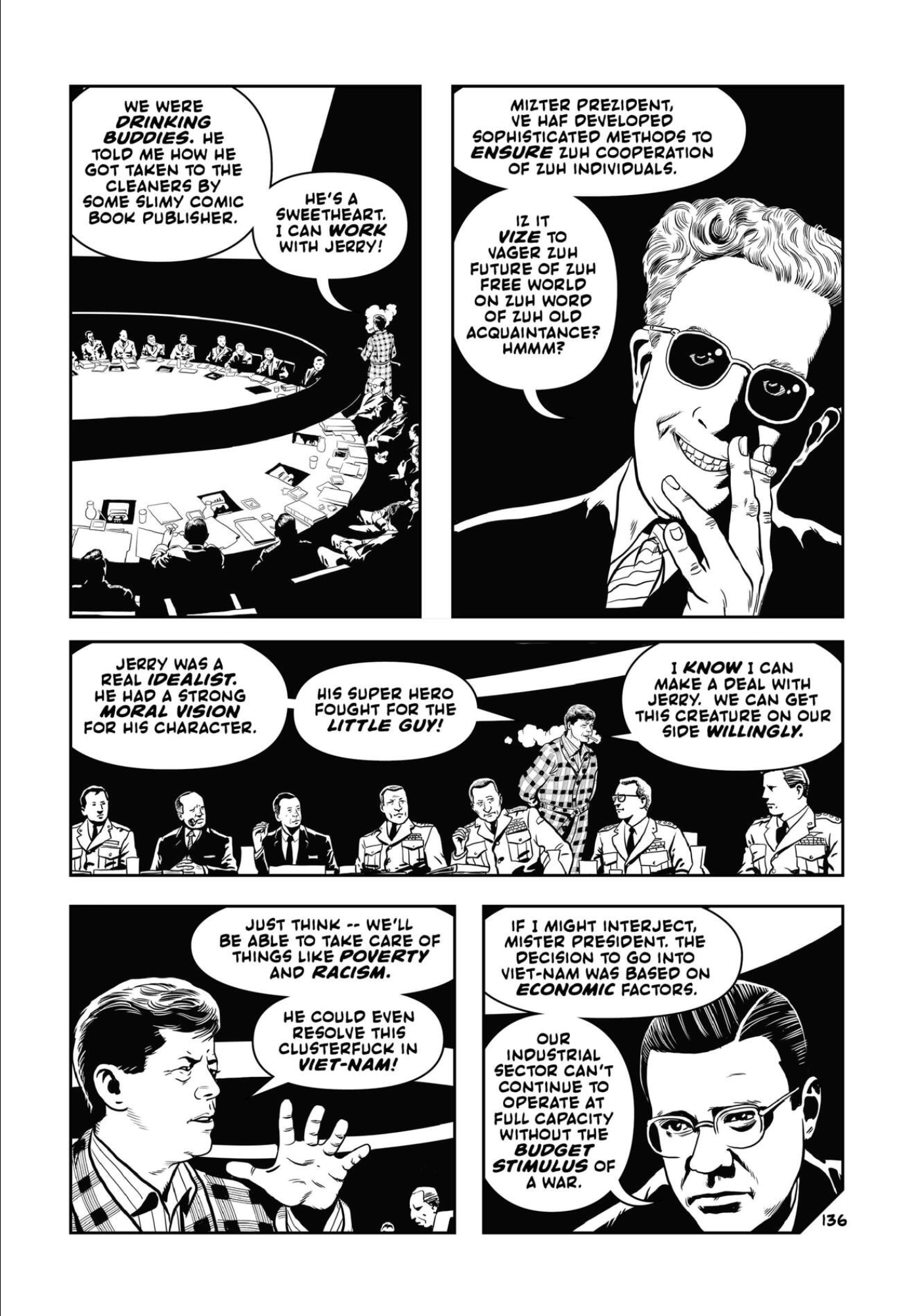
Even going so far as to have Strangelove in the room. It's not just that you showed the War Room, you actually put Peter Sellers as Dr. Strangelove in the room with Kennedy during those conversations.
It fits in The Maximortal, doesn't it?
It absolutely fits. Again, it has that balance of pure absurdity and satire, alongside all of these other spiritual concepts.
I'm winking back at the reader, because my whole superhero conceit is playfully ridiculous to begin with.
Sticking to your original King Hell timeline, it's going to end in the early '90s. Have you considered at all extending it more to incorporate other events, or is it still going to end where you originally said?
It's going to end. I've actually done two chapters of the ending.
Those would be the Brat Pack/Maximortal Super Specials?
Which are out of print now. But I’ll be getting get those back in print soon. And ultimately end my story in the late '80s, early '90s.
All these series are essentially catching up to Brat Pack and then comes the epilogue, or whatever comes after.
Yes.
I guess then there's no plans to incorporate any of the events of the comics industry of the '90s?
No, but I do want to touch on the '80s. I can see myself creating analog characters inspired by the creators who had the most impact like Miller, Moore and the Turtle guys. Then there’s the problem of myself.
I was going to say, you have to put yourself in at that point.
I haven't got it figured out yet.
Your other magnum opus, if you can have more than one, I think we're up to three or four at this point, would be Rare Bit Fiends, which is your dream diary in comics form, and I think - correct me if I'm wrong - is the largest art project of its kind?
Possibly. I'm just working on issue 25 now. The previous 24 issues of Rare Bit Fiends constitute a vast amount of dream art. A lot of people have created dream art, and dream comics, but I've really focused on it and ended up creating a fairly large body of dream art spanning five decades of my life.
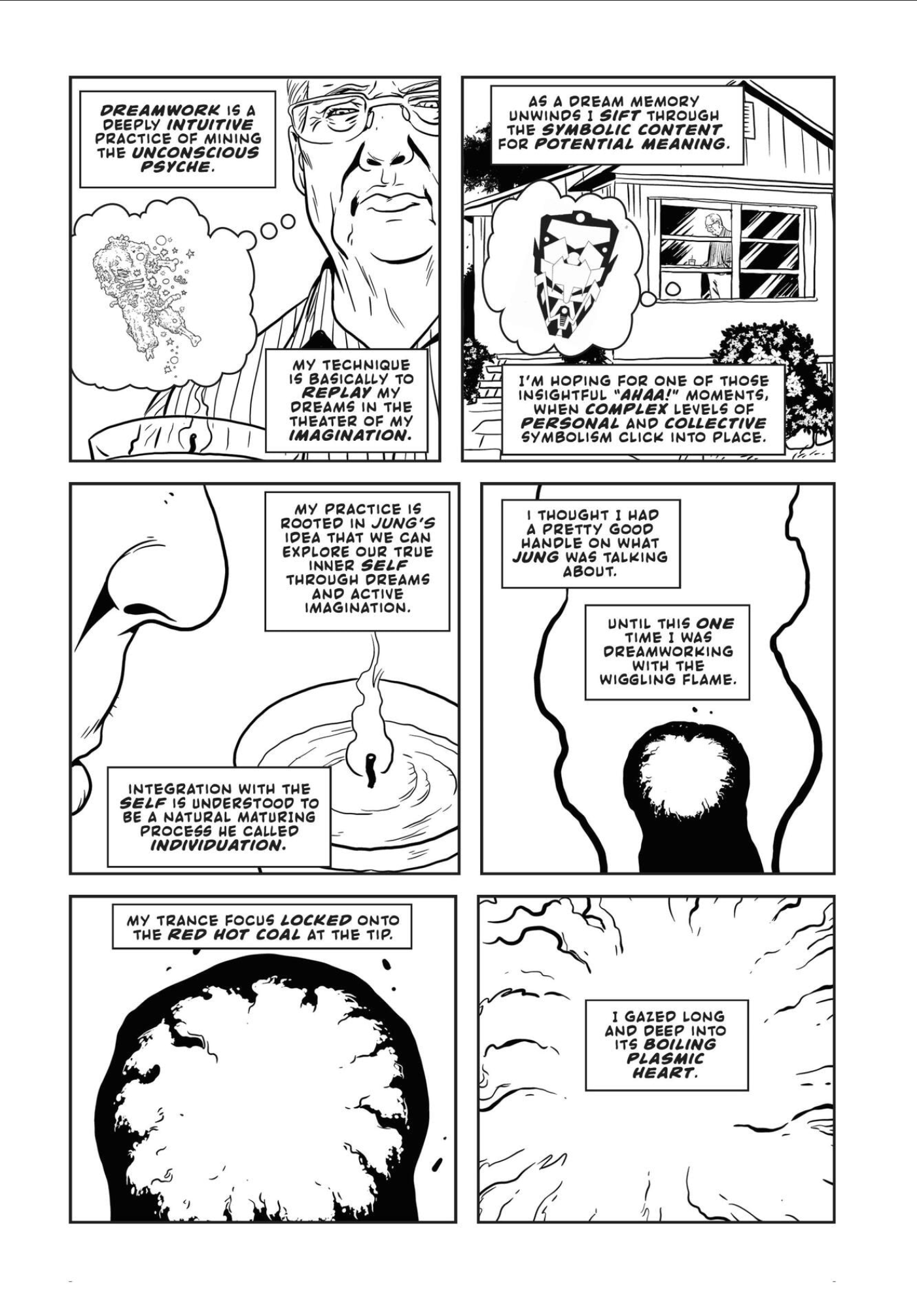
Has your process for creating those issues changed or evolved at all over the years?
I still write down my dreams every morning and pay attention to them as a sort of therapy/spiritual practice. When I'm drawing the comics, I'll take these notes and put them across the top drawing board. I'll create the comics from those raw notes. Sometimes I'll realize, "Hey, that one I had on Monday it's another part of the same story as the one I had last Friday." So sometimes I combine two different dreams to make a single dream comic page. The whole process has really helped me understand myself better.

Well, it's interesting to go back and look at individual issues now because you can see things in Rare Bit Fiends that are similar to some of your Panel Visions work that's similar to The One that's similar to Maximortal, there's definitely throughlines through all of it like that.
Dreaming is core to me, who I am. You know how a boat has a keel? That's what dreams are to me. They help keep me from tipping over, if that makes sense?
I think so. And it’s been that way for your whole career?
Yes. Then five or six years ago, I had some powerful visionary experiences, not unlike what Phillip K. Dick had. Are you aware of what I’m talking about?
Yes. The person at the door with the necklace? [In 1974, the science fiction author Philip K. Dick had a sudden experience in which he felt he saw the world as it truly was. This informed his latter works, and was memorably adapted into a short story by Robert Crumb in Weirdo #17.]
Well, I’ve experienced that thing that Dick’s talking about too. That's what the last three issues of Rare Bit Fiends have been about. Me trying to figure out what that is, and demonstrating how my dreams continue to comment on that kind of experience.
Before we end, I want to come back to the state of the industry, because these last few years have been so productive for you, and because your career has steered you through so much. What do you think of opportunities for creators today both in and out of mainstream comics?
Well, it's got to be tough for young people.
Your kids went into comics too, right?
Yes. I can open some doors for them, but in terms of making it a full-time career, it's extremely difficult. A lot of people my age have thrown in the towel as well. I know I’m really fortunate to be in the creative space I am right now.
What's next in the short term for you?
Well, right now I'm finishing up the farming comics for UVM. I’ve got Rare Bit Fiends #25 half finished. And I'm putting together a collection of my underground stuff called BONG! The Underground Comix of Rick Veitch. It will reprint Two-Fisted Zombies and the stuff I did with Steve Bissette in the '80s among other madness. I did a short story for Slow Death Zero that will be included as well.
And you have one more issue of Boy Maximortal as well?
Yes. That'll finish the second graphic novel. I'm thinking I'm going to concentrate more on this Heroica stuff in the coming years. I'm getting old and if I really want to finish all five books, I've got to get it out at a quicker pace.


